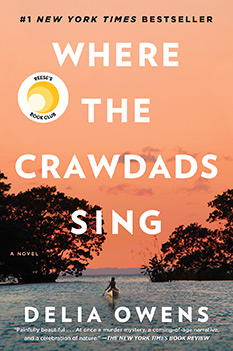
My reading life is full of coincidences. Last month I read The Old Curiosity Shop. A month later, I find myself reading what I take to be Charles Dickens time-traveled and teleported into 21st century North Carolina. What that means is that, while Delia Owens’s Where the Crawdads Sing is a good novel, it doesn’t really belong to our time. Another way of putting it is: this is pure escapism. That’s not necessarily a bad thing, especially now, when those of us with any sense keep to ourselves and avoid travel. For many of us, escapism is all we’ve got. However, as when I read Dickens, I don’t share the author’s sensibilities. I regard myself as a post-modern reader and so I don’t take well to a sentimentality that verges on kitsch, or race viewed through rose-coloured glasses while flirting dangerously close to historical revisionism, or pat plot resolutions that leave a hint of throw-up at the back of the throat (the same taste I had when I read about Little Nell). The bad people are obviously bad; the good people are obviously good; the Black people are benevolent souls who will inevitably rise to a position of equality in the social order; and the town gossips will eventually see things aright when put to it.
Instead of Nell, we have Kya, aka the Marsh Girl, youngest child of “white trash” people who live in a shack smack in the middle of North Carolina’s coastal wetlands. Survival drives her mother and older siblings to walk away from it all, leaving her alone with her alcoholic sometimes abusive father. He vanishes too and Kya has to fend for herself. Instead of Kit, we have Tate, son of shrimper, who loves to fish near Kya’s cabin and takes a shine to the girl, bringing her gifts of rare bird feathers, teaching her to read, explaining what’s happening to her when she gets her period. Instead of the loathsome Daniel Quilp, we have Chase Andrews, captain of the high school football team, son of a prominent business owner, entitled white dude and skirt chaser, aspiring rapist. You get the idea.
When Chase ends up dead in the mud at the foot of a lookout tower, the yokel sheriff and his deputy conduct a yokel investigation that leads them naturally to the Marsh Girl. There is no direct evidence linking her to anything, but they arrest her anyways and the prosecutor says he’ll seek the death penalty if he gets a conviction. A trial follows. You can almost feel the editor in the background helping to craft something that slips comfortably into a straight-to-Netflix movie script. Trials come with the drama built-in. Kya gets her representation pro bono from a kindly old lawyer who, along with the judge, has been ripped straight from the pages of any one of half a dozen Dickens novels. The acquittal is a foregone conclusion and the final pages deliver the obligatory plot twist. That’s it. Marshes are shallow places.
I have a theory about contemporary white fiction which is a corollary of a more general theory of fiction, namely that fiction is only ever any good when it arises from the writer’s personal experience of struggle. Not a struggle arising in a well-structured plot, but a struggle lived in the bones. The problem with contemporary white fiction is that whiteness is largely bereft of deep struggle so that the content, the raw stuff of a literary art, has largely evaporated. This isn’t universally true; there are struggles related to mental illness, disability, gender persecution for example, that continue to inform white fiction in deep ways. But for most of us, the attempt to use fiction to give structure and meaning to our experience in the end only yields pap.
…
After additional thought, I realize I don’t believe the theory I’ve mentioned above. It might be true of some work some of the time. But, as a more general proposition (I hate using the word proposition in the context of a discussion about art), I think the mark of good writing is the extent to which it creates space for the reader to freely explore matters of the heart, mind, and spirit. That’s why I despise didacticism and books that move inexorably to predictable conclusions. The problem with Crawdads is that it leaves me with no questions. I can set it down and safely forget it.